23+ SAMPLE Interview Summary Sheet
-
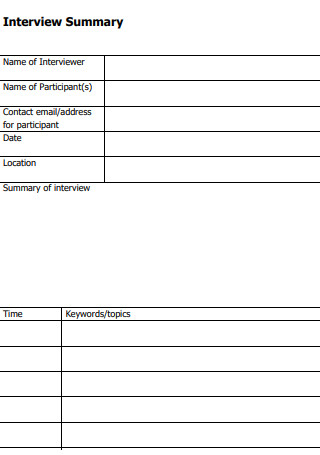
Printable Interview Summary Sheet
download now -
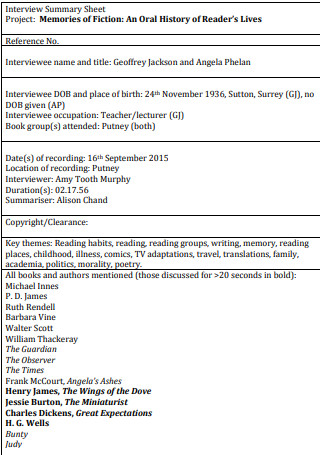
Interview Summary Project Sheet
download now -
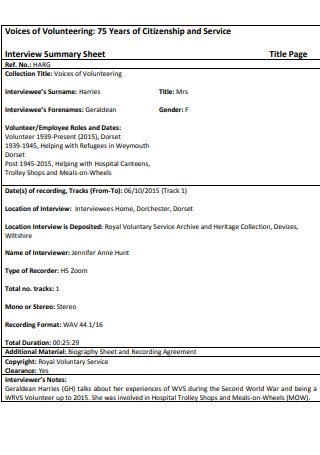
Interview Summary Service Sheet
download now -
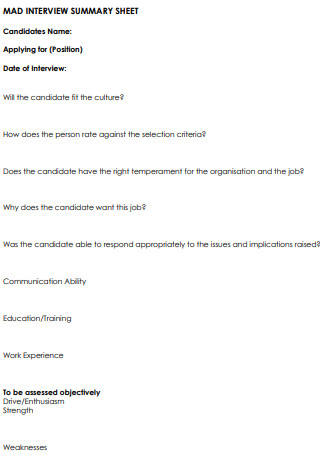
Candidate Interview Summary Sheet
download now -
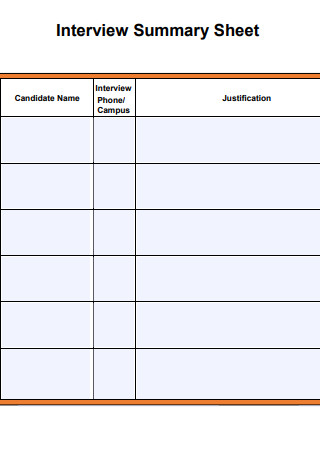
Faculty Interview Summary Sheet
download now -
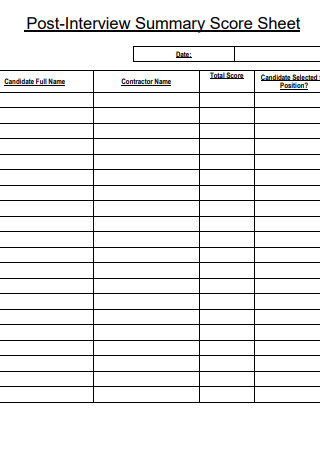
Post Interview Summary Score Sheet
download now -
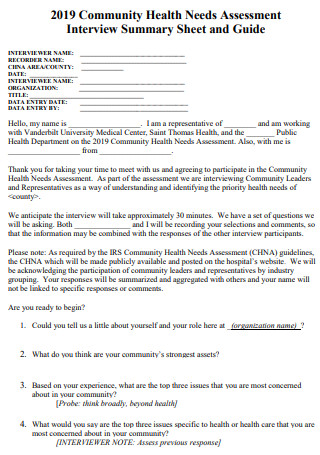
Medical Interview Summary Sheet
download now -
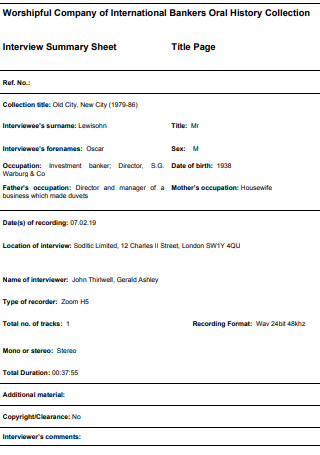
Bankers Interview Summary Sheet
download now -
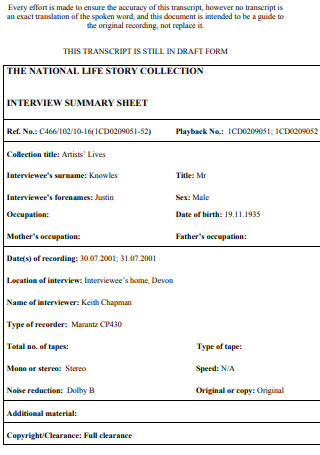
Artist Interview Summary Sheet
download now -
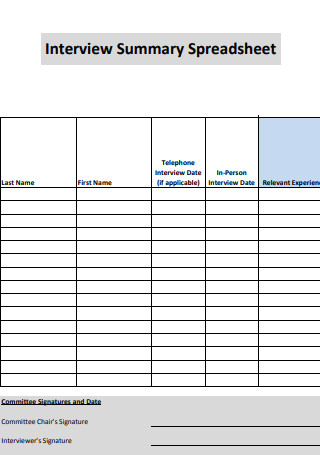
Interview Summary Spreadsheet
download now -
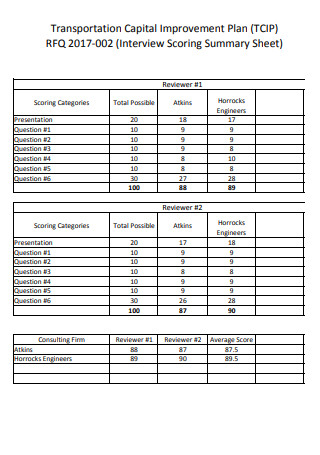
Interview Scoring Summary Sheet
download now -
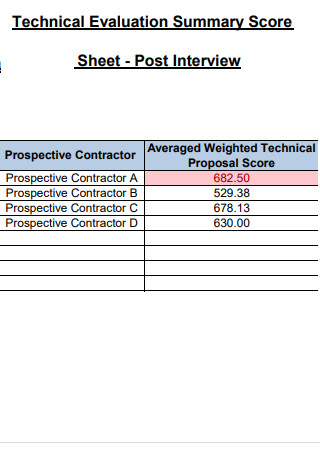
Post Interview Technical Evaluation Summary Score Sheet
download now -
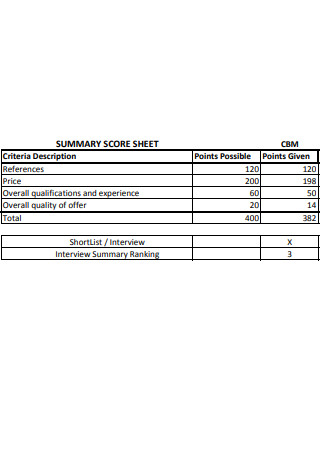
Sample Interview Summary Sheet
download now -
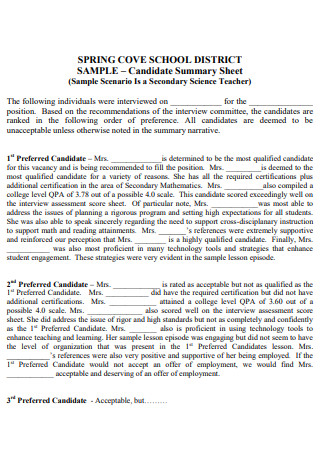
Formal Interview Summary Sheet
download now -
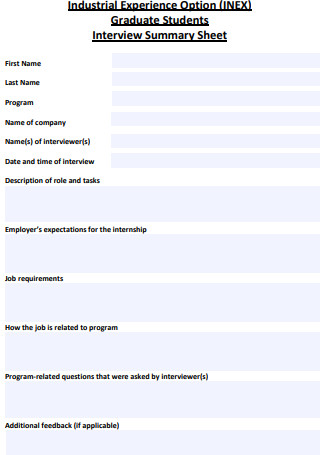
Graduate Students Interview Summary Sheet
download now -
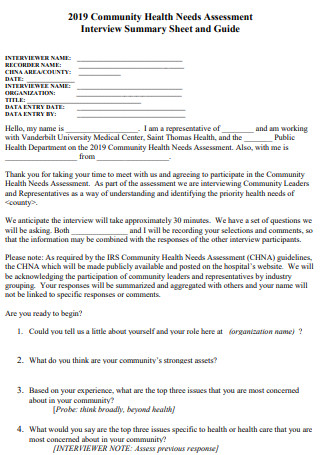
Interview Summary Sheet and Guide
download now -
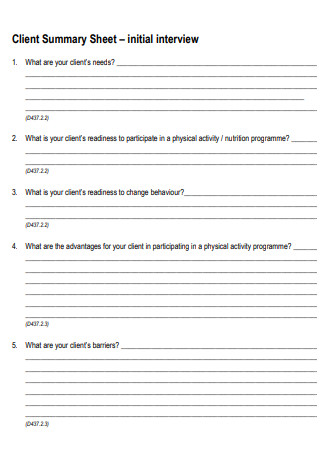
Client Summary Sheet initial interview
download now -
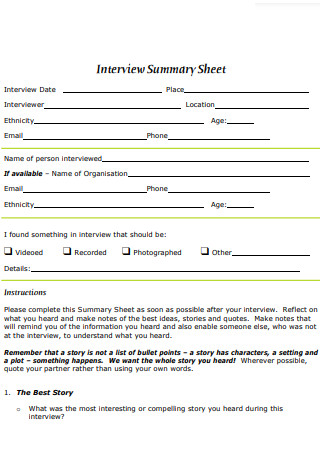
Interview Summary Sheet Format
download now -
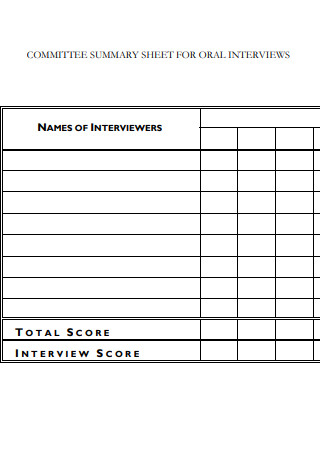
Oral Interview Commitee Summary Sheet
download now -
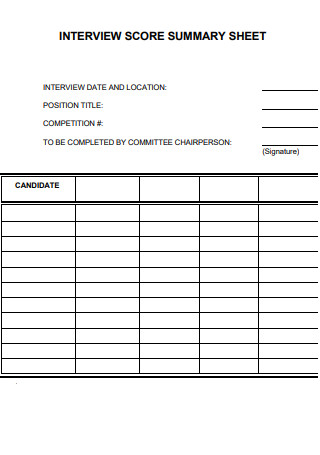
Standard Interview Summary Sheet
download now -
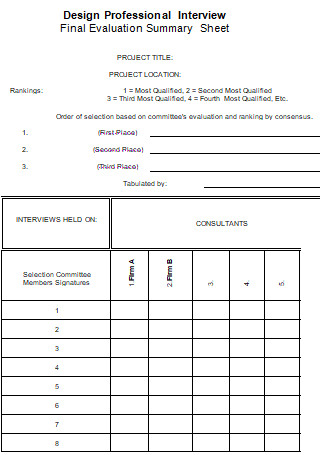
Interview Final Evaluation Summary Sheet
download now -
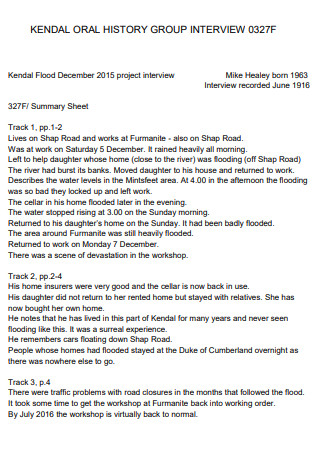
Group Interview Summary Sheet
download now -
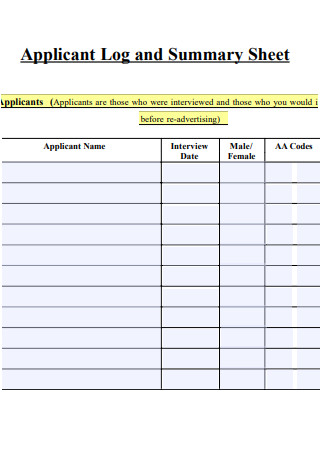
Interview Applicant Log and Summary Sheet
download now -
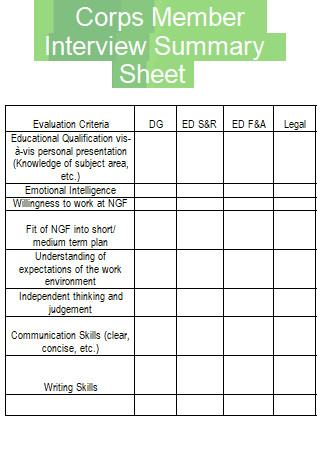
Corps Member Interview Summary Sheet
download now
What Is an Interview Summary Sheet?
An interview summary Sheet is a document that tallies the main points during an interview session. Making a summary of an interview might help you make better-recruiting selections. Before deciding which applicants should be short-listed, go over your notes. Alternatively, if you discuss the applicant selections with another member of HR or a hiring manager, your summary will help you remember the candidate’s credentials and interview replies. Positions and employment with well-known industry leaders or preferred companies frequently draw a large number of competent candidates. When it comes to recruiting personnel, summarizing your interviews allows you to make informed decisions.
Why Make Summaries?
A summary’s purpose is to gather important fundamental information about the interview’s conditions and provide a succinct guide to its contents. A summary should contain the people, locations, events, and subjects mentioned in each interview, as well as an indication of how significant the reference is. You should provide a timecode to identify where the reference appears during the interview. Rather than describing specific viewpoints or stories, focus on presenting a concise description of what was discussed in the interview. The summary should be a guide to what may be learned from the interview, not a paraphrase of what was stated.
How to Write an Interview Summary Sheet
Now that the interview summary sheet has been elaborated and its importance is given, it is time to proceed to the guide in writing your own document. There are available downloadable interview evaluation forms that you can also use alongside an interview summary sheet as well as a Summary Report. All of which will come in handy in creating your interview summary sheet. Without further ado, it is finally time to show you the steps in writing the sheet. Remember, there are available templates and references that can guide you through.
Step 1: Write an introduction
In the Introduction, give your readers, whether they are your supervisor or the HR department, the important facts regarding the interview in the beginning. The name and position of the subject should be stated. Explain why you chose to interview the candidate or individual, and what you plan to do with the results.
Step 2: Provide a relevant overview
Write a summary of the interview in one or two paragraphs. Include subjects you addressed with the interview subject, as well as a quick summary of their responses. Instead of going into extensive depth, provide Summary remarks that give the reader a sense of what the material is about.
Step 3: Discuss the most important results
Write a paragraph or two on what was stated throughout the interview. Only provide facts or stories that are related to the interview’s aim. If you found something unusual, talk about it in this area.
Step 4: Discuss the situation
Write about the interview’s conditions. Discuss the subject’s behavior or a series of odd mannerisms. Explain how the interview was affected by the surroundings. Write about the responses of the topic to your inquiries. You can include here whether or not the interview process was well adapted by the interviewee or how they reacted upon hearing the set of questions.
Step 5: Conclude the interview summary
Summarize the Interview and your main results in three to five sentences. Reiterate how you intend to use the information obtained during the interview. Remain objective, this is not an essay that you can add in your notes or thoughts over the matter, instead, you may use an interview rating sheet for that. Don’t bring up new points as well, the conclusion needs to wrap up all the points that were stated.
Necessary Items for an Interview Summary Sheet
An interview summary sheet is not enough to be a stand-alone document, instead, it would need the presence of other types of documents or items that will provide additional support to it. Supplementary items will act as proof of the instances surrounding the particular interview that took place. Other than that, it merely acts as additional evidence on the contents of the interview summary sheet. You can check out the sample interview feedback report as a reference and comparison.
Things to Avoid during an Interview
An interview isn’t just about spending an hour or two with a prospective employer. The amount of preparation you do for an interview determines how successful it is. Once you have booked an interview, whether it’ll be in person or over the phone, you should start preparing. Researching the company, reviewing your CV, choosing your finest clothing, and fulfilling any pre-interview procedures all take time and should not be left till the last minute. Check out the available Interview Checklist or interview sheet template to prepare yourself as both the interviewer or interviewee.
FAQs
How do you summarize an interview result?
Transcribing and presenting a storyline is essential for summarizing Qualitative Data gathered from interviews. Transcribing is the process of translating what was said in an interview tape to text and then looking for patterns by labeling the utterances. In order to create a clear evaluation, you may need tools to properly review the interview. Headphones are without a doubt the most crucial piece of gear you’ll require. Some customer recordings will be of excellent quality, while others will be of poor quality. Having a decent pair of headphones to cut through background noise, accents, and slurred speech may greatly aid in the transcription process.
What are the different types of interviews?
The different types of interviews are namely; informational interview, screening or telephone interview, individual interview, small group or committee interview, the second or on-cite interview, behavioral-based interview, and task-oriented or testing interview. It is important to be aware of the various types of interviews in order to easily identify which interview evaluation form will be fitting for you to use. This goes hand in hand with knowing how to create an interview summary sheet as well.
Do you need a consent form for interviews?
There may be interviews that will ask permission for your participation, such as a research study. It is entirely up to you whether or not to participate. You are not obligated to participate if you do not choose to. Although if you do, some interviews may hand out a consent form for you to sign and legally acknowledge your participation and that the information you have given to them can be utilized for their usage. As the examiner, create an Interview Schedule and a set of interview questions as well to prepare beforehand.
Interviews without any paper trail is not acceptable in most cases, especially in a job interview or even in a research study. An interview is vital not only with the information the interviewee shares but also with how they carry themselves and answer the questions. Through the interview summary sheet, you are able to summarize all the relevant information and keep it stored for future references or when your supervisor would like to review it.